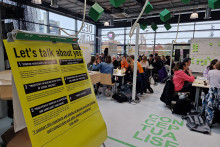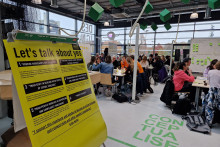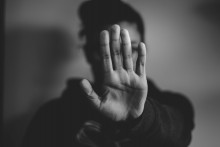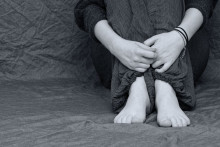Let's Talk About Yes! That is the slogan under which a group of UT students organised an evening programme on behalf of Amnesty International in the Spacebar at Stationsplein, about sexual violence against women. On this evening, women – experienced experts or representatives of other women – let their voices be heard and artfully conveyed intense and intimate feelings and experiences to the public. Their message was clear and I can no longer ignore it. The reason I am writing this opinion piece is that I am fed up with being part of the deliberately naive status quo of society: men. That is why I want to open up this conversation with all my fellow men and talk about our own behaviour. Let’s talk.
On the top floor of the Spacebar, the so-called Sickhouse, an art exhibition had been created. It was divided into four rooms, each representing a stage of the process that women go through when they are confronted with sexual violence: Social conditioning, Assault, PTSD and Healing. Behind the exhibition was an open space with a stage where the audience was addressed, poetry was recited, cool women played hard techno, stories were told, and films were played. Two elements of the evening struck me the most. Firstly, the group of female organisers who fiercely spoke to the audience and supported each other physically and vocally. They told an intimate and painful story, but with full conviction. Secondly, the expressive art, which not only supported the story of sexual violence visually but also made its way through your soul. It is clear that the story in itself is not enough. Friends who make up their own interpretation of your story or the police who tell you that you should have drunk less. They have been telling the story for so long, but still we do not listen.

After six years of studying a rather technical subject (Applied Physics), being surrounded mainly by men and in the meantime hardly seeing a single man stand up for the place of women in society, my trust is gone. Us men always know what to say, but we don’t listen to what we are told. No, you don’t have to be ashamed to be a man, but let’s really look at ourselves in the mirror for once. Watch and listen, not necessarily to me, but to the women.
The Amnesty International group focuses on making sexual violence within the university a subject for discussion, but unfortunately `the university’ was not present at this event. The artistic multicultural group that was present is not a cross-section of our university. Especially at a technical university like ours, where the percentage of female professors in 2018 was only 17% percent, where entire student boards are made up of men and where most technologies and algorithms are male inventions, this is exactly where we as men need to look at each other. Feminism, a fight for equal rights between – and equal treatment of – men and women, is something everyone should be fighting for. But till now, men are standing on the side line. Preferably looking away when their `friend’ or ‘mate’ misbehaves again. Why don't we men talk to each other about this? Why isn’t there a male professor or director who comes out to be a feminist? Why are we always mansplaining things to women when we don't even know what it's like to be pinched in the butt for the so-manieth time or to be pinned against the wall?

And if you're thinking, I’ve never heard women around me talk about this, it's not because it doesn't happen. According to the most recent report by Amnesty International, one in ten female students experiences rape. Look how many women you have as a friend on Facebook or Instagram and the rest of the maths is pretty simple. And then we’re just talking about rape. I would like to open up this conversation with all my fellow men and talk about our own behaviour. This can be uncomfortable and painful, but the end goal is not a sense of guilt, but awareness and prevention. The University of Twente must not only provide a safe climate, but also an open culture where we can talk to each other about this topic. Since this university consists for a large part of men, we must take our responsibility and actively – on our own initiative – contribute to this discussion. Because only by raising a fist against this problem, men and women together, can we fight for equal rights between, and equal treatment of, men and women. I am a man and a feminist, are you?
Jeroen Boerma, Master student of Applied Physics at the University of Twente








